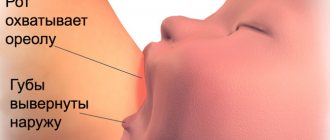Benefits of B9 for breastfeeding
It’s not difficult to guess the benefits of folic acid during breastfeeding. One has only to study the consequences of B9 deficiency.
For mother:
- depression after childbirth;
- apathy;
- decreased lactation;
- fast fatiguability.
For baby:
- slow weight gain;
- decreased immunity;
- deterioration in development, both physical and psychological;
- disruption of the digestive system.
Interesting to know! A sufficient amount of folic acid after birth improves not only the volume of breast milk, but also its quality.
Therefore, taking B9 supplements is of particular importance for nursing mothers.
Products with vitamin B9 for nursing
Most folates are found in fresh green vegetables and wheat germ. What else can a nursing mother eat with confidence that it will not harm her breastfeeding baby?
A lot of B9 is found in the following products:
- spinach;
- parsley;
- green salad;
- broccoli;
- walnuts;
- beef liver;
- beans.
Slightly less B9 is available in cereals:
- rice;
- cell;
- barley;
- buckwheat;
- manna;
- oatmeal.
A sufficient amount of vitamin B9 is found in all types of cheese, tomatoes, boiled eggs, and citrus fruits. When consuming citrus fruits and tomatoes, mothers must ensure that the baby does not become allergic to them. There is B9 in watermelons, seeds, vegetables, wholemeal bread, green onions, marjoram, wild garlic, cod liver, trout, horse mackerel, perch, green peas, pumpkin, porcini mushrooms, almonds, cottage cheese, boiled carrots, white cabbage, berries strawberries, currants, raspberries, beets, peaches, bananas, melons, rose hips, as well as sesame and poppy seeds.
Harm and contraindications
Folic acid for women during breastfeeding can be harmful. There will be no benefit if you take supplements without your doctor’s permission and study the instructions. It is necessary to adhere to the dosage and take into account contraindications:
- Individual intolerance and allergies.
- Hypersensitivity to the components of the drug.
- Anemia caused by cyanocobalamin deficiency.
For malignant neoplasms, the vitamin is prescribed with caution, at the discretion of the doctor.
Safe form B9
Folic acid is a synthetic form of vitamin B9. Its non-natural origin may not always have a positive effect on the body. The fact is that the acid is well metabolized only with high activity of the enzyme dihydrofolate reductase. If the enzyme is not active enough, then it will be much more difficult for the synthetic compound to transform into the natural form of B9.
An increased content of unmetabolized folic acid leads to disastrous consequences:
- the risk of developing cancer increases;
- children may develop autism;
- It is more difficult to determine B12 deficiency.
However, this does not mean that folic acid is dangerous during lactation or pregnancy. We all know that this is the main women's vitamin. It's just that the synthetic derivative is not the safest. Such drugs have contraindications, which should be given special attention.
If the correct dosage is observed and metabolism is good, the synthetic compound will only provide benefits.
Which forms are safer? There are two active B9 derivatives: folinic acid and methylfolate. The latter is mainly prescribed in case of detection of a mutation in the MTHFR gene, which is observed in 10-40% of people. The fact is that such a mutation interferes with the absorption of folic and, by the way, folinic acids.
In special cases, folinic acid and methylfolate are prescribed simultaneously. This often occurs with B12 deficiency.
Active forms are taken under the supervision of a physician. At the discretion of the specialist, an individual course of treatment can be developed.
How to take folic acid during lactation
Only a doctor can prescribe any medications, taking into account any contraindications for the medication. The specialist calculates the volume and regimen of medication and determines the treatment period. Each drug has its own instructions for use during lactation.
Correct dosage
Dosages are prescribed in the instructions for each medicine; based on these instructions, the doctor chooses the dosage and regimen of taking the medicine.
Daily vitamin intake
The daily vitamin requirement takes into account age, lactation time, and the health of the nursing mother and children:
- children under one year old – 50 mcg;
- from one year to 3 years of age – 70 mcg;
- nursing mother – 500 mcg.
The need for folate is significant for the child’s body, from the very beginning of fetal growth in the womb, and then during breastfeeding.
In what cases is it necessary to increase the dose?
During breastfeeding, a woman’s need for vitamin B9 increases significantly; the daily dosage is increased to 500 mcg, taking into account its rapid consumption. Increasing the dose prevents depression, which often occurs in women after childbirth, and general weakness of the body. An increased dosage of B9 improves lactation and the quality of breast milk. Complete mother's milk protects the baby from disturbances in intestinal functions, from delays in psychomotor development, and contributes to the proper development of the infant's immunity.
Products containing B9
Any nursing mother needs a balanced diet. The table will help determine the list of food components rich in folic acid.
Table. Products containing B9
| Product | Content per 100 g, mcg |
| Peanut | 240 |
| Sunflower seeds | 227 |
| Soybean (grain) | 200 |
| White dried mushrooms | 140 |
| Parsley | 110 |
| Cod liver | 110 |
| Sesame | 97 |
| Beans | 90 |
| Avocado | 89 |
| Spinach | 80 |
Not all of the above products are good for a nursing mother. Your baby may be allergic to peanuts. And nuts are heavy food for a baby under 3 months. It is recommended to introduce kernels into the diet gradually, consuming several pieces at a time and observing the baby’s reaction. The same goes for seeds.
The most useful foods with folic acid for breastfeeding in the initial stages are parsley and spinach. And in small quantities - cod liver, sesame, avocado.
Composition and features of folic acid
The element is extremely necessary for a nursing mother, since during breastfeeding it is quickly consumed and passed on to the baby with milk. The drug is produced by manufacturers in two forms:
- solution for intramuscular injections;
- yellow film-coated tablets.
It is not recommended to use the drug on your own; you need to consult a doctor. He will select the required dosage and prescribe the duration of taking the vitamin. The medicine is sold in blisters packed in cardboard boxes or in glass jars. The vitamin contains additional components:
- lactose;
- copovidone;
- stearic acid;
- sucrose;
- potato starch;
- MCC.
The inclusion of auxiliary ingredients in the composition of the drug depends on the manufacturing technologies used by the manufacturers. Vitamin B9 deficiency causes premature birth, delays the development of mental abilities and the growth of the baby. A lack of B9 in a nursing mother can cause heart attack, stroke and other serious pathologies.
Additives: instructions for use
Discuss taking folic acid while breastfeeding with your doctor. However, there are general recommendations for the use of such drugs.
When to start taking
It is necessary to start taking B9 supplements before pregnancy. In case of unplanned conception - from the very first month. The earlier the better. We provide appointments throughout the first trimester. Further - at the discretion of the doctor. The drug is then prescribed after childbirth. The main reason is to prevent anemia in mother and baby.
What is the importance of folic and iodine for a child, see the video:
Iodine and folic acid are the key to the health of mother and baby
Until when should you drink?
At a safe dose, supplements are taken throughout the entire period of lactation. If the period lasts for a long time, interruptions are possible. The course is discussed with the doctor individually.
Dosage
The dosage of folic acid during feeding is 200-600 mcg per day.
Overdose
If the dosage is exceeded for a long time, the following symptoms may appear:
- bloating and flatulence;
- nausea, vomiting;
- worsening sleep;
- impaired absorption of B12.
Overdose is highly discouraged, especially when breastfeeding.
Side effects and allergies
Side effects that may occur from taking folic acid include:
- anorexia;
- disorders of the stomach and other gastrointestinal organs;
- respiratory dysfunction;
- unpleasant taste in the mouth.
The synthetic form of B9 may cause an allergic reaction. Therefore, after taking the first tablet, it is recommended to monitor the body’s reaction. Itching, redness and hives are sure signs of allergies.
Consequences of folic acid deficiency
In pregnant women
B9 deficiency is dangerous at any age, but it has a particularly strong impact on pregnant women. An insufficient amount of this vitamin during pregnancy can provoke the development of serious defects in the unborn child:
- A violation of the formation of the brain, which manifests itself in hydrocephalus - an excess amount of cerebrospinal fluid in the skull, and ancephaly. With hydrocephalus, the brain is unable to develop because the circulation of cerebrospinal fluid is disrupted and the fluid puts pressure on the brain. In ancephaly, the brain is absent.
- Abnormal formation of the facial bones, the most common manifestation of which is clefts in the hard and soft palates and a pathology known as “cleft lip”.
- Severe spina bifida, accompanied by spina bifida.
- Heart defects, often difficult to treat.
- Defects in the development of the genitourinary system that can lead to the death of a child.
In addition, such children are often born prematurely and suffer from digestive disorders and delayed psychomotor development.
The woman herself is at great risk - placental abruption and bleeding are the smallest manifestations of B9 deficiency. Added to this is the threat of miscarriage and a high risk of prolonged postpartum depression.
Among women
Even if a woman is healthy and not pregnant, a lack of B9 will not bring her anything good. Hair and nails will be the first to be affected. If you take care of yourself, but nevertheless your nails peel, break and grow poorly, before you buy vitamin D3, look for the root of the problem in the lack of this vital substance. If your hair does not please the eye with its beauty and fullness, despite salon treatments and the use of high-quality cosmetics, and the remedy for wrinkles under the eyes does not help, it is possible that the solution to your problems lies in a jar of vitamins. Remember, if you lack folic acid, no coenzyme 10 will make your skin perfect.
This substance is also extremely important for women after 40. Firstly, it delays the onset of menopause and significantly softens the manifestation of all menopausal processes, including hot flashes, increased irritability, and depression. Secondly, timely intake of B9 helps preserve memory and high speed of thought processes, and is a good prevention of Alzheimer's disease.
In men
For a long time it was believed that B9 deficiency does not have a serious effect on men and they can do without consuming it, but studies conducted in the last decade have shown that insufficient amounts of folic acid have a very negative effect on the quality and production of sperm. Defects accumulate in them, the chromosomal set suffers, and the likelihood of conceiving a child with chromosomal abnormalities increases.
In adolescence, boys who do not receive enough B9 develop more slowly, they develop hair later, voice formation is impaired, and muscle mass does not grow quickly enough. It is folic acid and testosterone that make a man complete.
In children
Pediatricians know that if there is not enough B9, the child's growth and development are delayed, since it is necessary for protein synthesis and normal functioning of the nervous system. Children with B9 deficiency are more likely than others to experience digestive problems, they have more intestinal problems, and they do not tolerate an expanded diet well.
A serious lack of folic acid can cause mental retardation, which will not be noticeable in infancy, but will appear in all its glory when the baby goes to school.
In both children and adults, insufficient intake of folic acid can cause a serious disease - megaloblastic anemia. It occurs due to improper formation of red blood cells. Blood cells become too large, do not carry oxygen well, and do not pass into the capillaries. As a result, a person quickly gets tired, constantly feels weak and lethargic, his heart rate is increased, and inflammatory changes appear in the membrane of the tongue. If you start taking vitamins B9 in a timely manner, the disease will disappear.
Recommendations for choosing folic acid
Medicines during breastfeeding must be of high quality. Before purchasing, you should read reviews both about the supplement itself and about its manufacturer. It is recommended to pay attention to imported dietary supplements.
Another significant factor is dosage. In pharmacies you can find products specifically for pregnant or lactating women. Each tablet already contains the required amount, which allows you to properly saturate the body with vitamins. Are you taking lactation supplements that already contain folic acid? Then you do not need to purchase additional drugs with B9.
TOP 5 supplements in the form of 5-MTHF
Interesting to know! 5-MTHF is involved in the production of the happiness hormone.
Check out the best supplements that are made in the most bioactive form of B9.
Doctor`s Best, Active folate 800 mcg
Doctor's Best, Active Folate 800, 800 mcg, 60 Veggie Caps
704 rub.
More details
Herbal preparation made in the USA. The package contains 60 servings. The dietary supplement is suitable for vegetarians. Covers the daily folate requirement during lactation by 100%.
There are no negative reviews found on the iHerb website. Consumers praise the American product. For a natural form, reasonable price and visible results.
Now Foods, Methyl Folate, 1,000 mcg, 90 Tablets
Now Foods, Methyl Folate, 1,000 mcg, 90 Tablets
892 rub.
More details
Country of origin: USA. The product is also available in a dosage of 5000 mcg. The package contains the same number of tablets - 90 pieces.
The product is presented in the biologically active form B9, which ensures easy digestibility. The dietary supplement is suitable for vegetarians.
Overall customer rating: 4.5 points. The disadvantages are minor. They are mainly related not to the drug itself, but to the conditions of purchase.
Life Extension, Optimized Folate, 1000 mcg
Life Extension, Optimized Folate, 100 mcg, 100 Veggie Tablets
858 rub.
More details
Country: USA. The package contains 100 herbal tablets. The drug is also available in a higher concentration - 5000 kg.
89% of buyers think this is an excellent, highly effective product.
Thorne Research, 5-Methyltetrahydrofolate, 1 mg, 60 Capsules
Thorne Research, 5-Methyltetrahydrofolate, 1 mg, 60 Capsules
RUB 1,615
More details
An American drug that is produced in the biologically active form of B9. Each capsule contains 1.7 mg DFE. The product is also available in 5 mg dosage.
The supplement has good reviews. And only 2-4% of buyers noted the occurrence of side effects.
Allergy Research Group, QuatreActiv Folate 4th Generation 5-MTHF, 90 Capsules
Allergy Research Group, QuatreActiv 4th Generation Phtholate 5-MTHF, 90 Capsules
RUB 1,438
More details
American high quality supplement in a natural derivative of B9. Covers the daily requirement by 125%.
Consumers leave only positive reviews. They note the composition, price, reliable manufacturer and comfortable reception.
Multivitamin with Folic Acid
Here are the TOP 5 multivitamin complexes, sorted by consumer ratings.
MegaFood, Baby&Me 2, 120 tablets
MegaFood, Baby & Me 2, 120 tablets
RUB 4,207
More details
An American product that contains 600 mcg of folate, as well as a number of other important vitamins and minerals. Does not contain artificial or harmful ingredients, suitable for vegetarians.
Judging by the numerous positive responses, the complex improves well-being, hair, nails and skin condition. The disadvantage is the high cost.
Pure Essence, Mother&Child, Formula Master PostNatal
Pure Essence, Mother & Child, Master PostNatal Formula, 120 Tablets
RUB 2,852
More details
Vitamin and mineral complex of American origin. There are 120 tablets in a package. Contains a number of useful substances. Particularly rich in ascorbic acid, tocopherol and B vitamins. Folate per serving (4 tablets) 800 mcg.
Many reviews confirm that this is an excellent drug for mother and baby. No unpleasant taste or smell. Noticeable result. However, there are also disadvantages. Some customers have noticed side effects.
Innate Response Formulas, Baby & Me, Mom & Baby Multivitamin, 120 Tablets
Innate Response Formulas, Baby & Me, Mom & Baby Multivitamin, 120 Tablets
RUB 5,373
More details
Country of origin: USA. There is another packaging option - 60 pieces. The product is of plant origin, which means it is suitable for vegetarians. Contains a complex of vital B vitamins and other nutrients. Folate is observed in an amount of 600 mcg.
Consumers note that the drug is well tolerated and gives positive results. A small number of buyers believe that this supplement has no effect.
New Chapter, Perfect Postnatal, Multivitamin, 96 Tablets
New Chapter, Perfect Postnatal, Multivitamin, 96 Tablets
RUB 2,565
More details
Country: USA. The product is also available in larger packages - 192 and 270 tablets. This is a fermented preparation with a natural composition. Rich in B vitamins, as well as A, C, D and minerals. Includes folate in the amount of 540 mcg, which covers the daily requirement by 90%.
The complex has more positive reviews. Buyers are delighted with their well-being and mood. Everything improved after the 1st course of treatment. Many have noticed restoration of hair growth after childbirth and many other positive results regarding health and appearance. However, there were some negative ones. And the minuses are given by those who did not notice the effect. Side effects have also been identified.
Fairhaven Health, Nursing Postnatal Multivitamin
Fairhaven Health, Nursing Postnatal Multivitamin, 60 Capsules
RUB 1,208
More details
American drug. Designed for nursing mothers. The package contains 60 capsules, which is enough for 1 month. The serving per day is 2 capsules. The composition includes folic acid in the amount of 800 mcg and a number of other nutrients. Especially vitamins A, C, group B and D.
The complex has few negative ratings. There are no critical disadvantages. Some mothers noticed an allergic reaction to the components of the drug. Positive reviews indicate the absence of side effects, comfortable use and noticeable results.
Additional benefits of taking folic acid
In addition to the prevention of neural tube defects, additional FC intake before and after conception has another beneficial effect - the prevention of congenital heart diseases and oral clefts [42–45], as well as preterm birth (as discussed above). The mechanisms by which FA exerts a preventive effect against the development of structural abnormalities in the fetus are unknown, but may involve the regulation of homocysteine metabolism [46].
Some researchers have concluded that taking FA may have additional beneficial effects on pregnancy outcome. This line of research arose as epidemiological studies showed that exposure to PK antagonists during pregnancy is associated with significantly higher rates of placenta-related pregnancy complications [47–50]. PK antagonists represent a wide range of drugs used for a variety of clinical indications, including the treatment of epilepsy, mood disorders and urinary tract infections.
PK antagonists can be divided into two groups: a) DHFR inhibitors (for example, sulfamethoxazole + trimethoprim), which block the conversion of folate to its more active metabolites (see figure); b) other PK antagonists, which are a group consisting mainly of anticonvulsants (phenobarbital, phenytoin, primidone and carbamazepine), but also including otilonium bromide (an antispasmodic drug containing low doses of phenobarbital) and cholestyramine.
One study noted that exposure to DHFR inhibitors (n = 12,546) or other FC antagonists (n = 1,565) during pregnancy was associated with an increased risk of developing preeclampsia (adjusted odds ratio [OR] = 1.52, 95% CI – 1.39–1.66), severe preeclampsia (OR = 1.77, 95% CI – 1.38–2.28), placental abruption (OR = 1.32, 95% CI – 1.12–1 .57), intrauterine growth restriction < 10th percentile (OR = 1.07; 95% CI – 1.01–1.13), intrauterine growth restriction < 3rd percentile (OR = 1.22; 95% CI – 1.11–1.34) and fetal death (OR = 1.35, 95% CI – 1.07–1.70) [49]. These adverse events have one thing in common: they all result from problems with implantation and placental formation that occur early in pregnancy. Since FA has been shown to regulate trophoblast invasion [51], there is a biological possibility that folate deficiency may interfere with early placental development, leading to pregnancy complications later in pregnancy.










